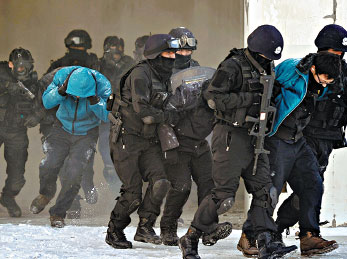

SWAT team members subdue suspected "hijackers" during a drill in Urumqi, Xinjiang Uygur autonomous region, on Monday. Fang Tao / Xinhua
Prevention programs provide path leading people away from violence
The city of Turpan and nearby areas in the eastern Xinjiang Uygur autonomous region have become a test case in the people's war against religious fanaticism.
The tourism city suffered a setback in 2013 after an extremist gangs' attack on a police station.
"We'd never thought religious extremism and terrorism were so close to our life before that day. The attack encouraged us to eliminate the evil forces at the root," said Liu Kaiqin, a local county chief.
Preventing terrorism and eliminating religious extremism have become top priorities of the Xinjiang government, which recently issued several edicts defining extreme religious activities and ordering officials at all levels to crack down on anti-social and life-threatening behavior prompted by religious beliefs.
A senior anti-terrorism researcher from Xinjiang, Ma Pinyan, said there should be zero tolerance of religious extremism and for religious training that encourages violence and terror.
All government departments and circles of the community have participated in the anti-extremist campaign in Turpan, said Zhang Wenquan, the prefecture director. "Terrorism is rooted in religious extremism. So we must fight religious extremism."
According to prefecture officials, in Turpan's Shanshan county 1,110 individuals are considered involved in or are easily affected by religious extremism and must be visited often by local officials and village heads.
One such individual was Ayinisa Ablimit, 33, a farmer in Lianmuqin township, who followed her husband's orders and refused to communicate with others.
Under preferential policies of the State, authorities helped the family apply for a loan to establish a sheep breeding base. They also asked local religious leaders to teach the couple and finally earned the couple's trust.
The wife now has taken off the niqab, the full-face black veil favored by ultraconservative Muslims, and written local officials a letter saying that they have led a good life and will shun extremism.
Kariman Ali, a 29-year-old farmer in Lukqun township, was persuaded by her fellow villagers to abandon extreme religious doctrine. She always wore a niqab, even when she sold snacks.
"I thought it was the traditional costume of our ethnic group," she said.
The training classes set up by the county have changed her mind. The county invited respected religious leaders to teach religion, and classes on laws, national regulations and histories of Xinjiang and nationalities were also arranged.
Kariman's business improved after she gave up the niqab and started wearing colorful clothes.
"Over 3,000 people in the prefecture were at the edge of extremism," said Zhang, adding that education and cultural development are the key goals.
"Nearly 97 percent of those affected by extremism have pulled back, but we must help them stay on the right track and not be pulled back again by the evil forces," Zhang said.
Zhang urged officials to promote cultural development both in urban and rural areas.
Shanshan county supported 351 rural households to create cultural activity sites in all villages.
Bostan, a township in Toksun county, poured 200,000 yuan ($32,200) into a carpet factory, hiring 11 females from the villages. Guliayishanm Memet, 28, has been a coach in the workshop. "I can get a 4,000 yuan salary every month," she said.
This work-in-village mode has been promoted in the whole prefecture as a measure to help them keep away from extremism, said Xu Shibao, Party chief of the township.
More than 100 terrorist cells have been eliminated in the region in the six months since the region cracked down on terrorism in late May, halting most terrorist attacks before they could be launched, Xinjiang Daily reported.
The region has also dealt with 44 cases involving instructions on the Internet on the use of explosives, 294 cases relating to the distribution of violent audiovisual material and four relating to spreading rumors.
The investigation found that the suspects were all influenced by audiovisual material that had content related to violence and terrorism, a police officer said.
More than 18,000 documents, 2,600 discs and 777 storage devices relating to religious extremism have been seized.
Copyright ©1999-2018
Chinanews.com. All rights reserved.
Reproduction in whole or in part without permission is prohibited.